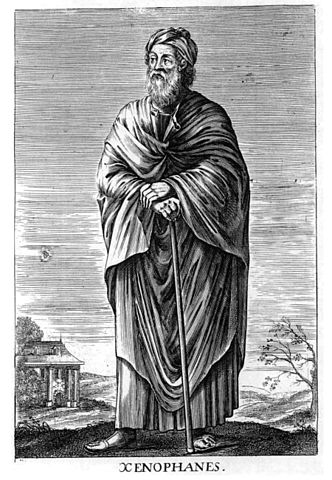Note: This article has been excerpted from a larger work in the public domain and shared here due to its historical value. It may contain outdated ideas and language that do not reflect TOTA’s opinions and beliefs.
From Early Greek Philosophy by Alfred Benn, 1908.
Xenophanes
Among those whom Heracleitus mentions as examples of learning without intelligence Xenophanes is one. In the order of time this philosopher, an Ionian of Colophon, precedes the great Ephesian; but for our purposes he may be most conveniently studied in connection with a school developed in express opposition to the theory of a perpetual flux.
I have called Xenophanes a philosopher; but he was primarily rather a poet of alert and many-sided interests who spent a long life wandering about Hellas and making a profession of reciting his own compositions at the banquets of the rich. It would appear that the conversation at such social gatherings largely consisted in repeating fabulous stories about the quarrels of Titans and Centaurs; and we know from Homer that scandalous ballads about the amours of gods and god- desses were sometimes part of the entertainment.
Xenophanes wished to introduce a higher tone, and as a preliminary he attacks the mythology of the old poets with uncompromising vigour. 'Homer and Hesiod,’ he exclaims, 'have attributed to the gods everything that is a shame and reproach among men—theft, adultery, and mutual deception.'
But not to think of the gods as like bad men is merely the first step in true religion; we should not think of them as like men at all.
'Mortals think that the gods are generated, that they have senses, a voice, and a body like their own. The Ethiopians fancy that their deities are black-skinned and snub-nosed; the Thracians give theirs fair hair and blue eyes. If oxen or lions had hands and could paint they too would make gods in their own image.’
So much for the aristocratic, Olympian religion of the poets. As to the popular Chthonian religion of the mysteries, with its suffering and dying gods, he is reported to have dismissed it with even briefer and more cutting sarcasm.
Asked by the Eleates should they sacrifice to Leucothea and mourn for her or not, he advised them not to mourn if they believed her to be a goddess, not to sacrifice if they believed her to be a woman.
For himself Xenophanes, like Anaximander, believed in an infinite source of existence; but, unlike his Milesian predecessor, he identified this one and eternal element with the visible earth, which he supposed to stretch downward beneath our feet without end. This infinite and eternal reality is God and the only God, resembling mortals neither in form nor thought, but perceiving and thinking through its whole extent.
We are told that Xenophanes created palaeontology, pointing to the impressions of marine animals and plants found embedded in the quarries of Syracuse as evidence that what is now dry land was once water, teaching also that it would at some future period be covered with water once more—a theory probably suggested by Anaximander's idea that man was evolved from a fish-like creature.
Benn, Alfred William. Early Greek Philosophy. Archibald Constable & Co, 1908.
About TOTA
TOTA.world provides cultural information and sharing across the world to help you explore your Family’s Cultural History and create deep connections with the lives and cultures of your ancestors.


